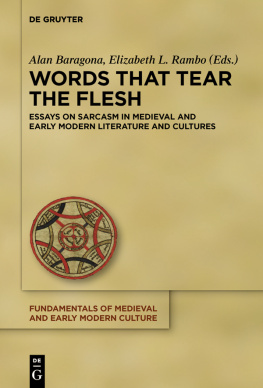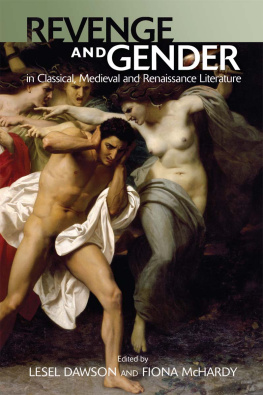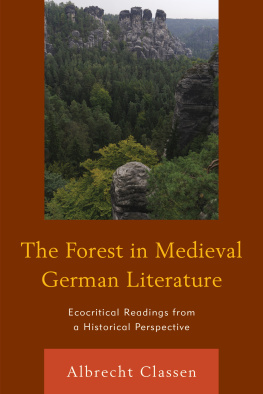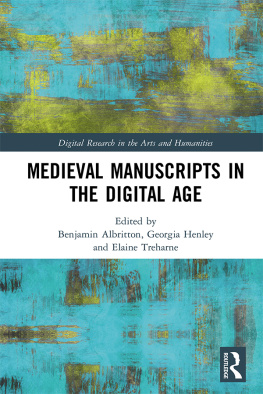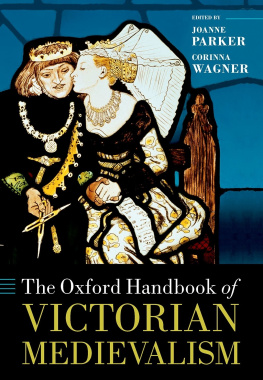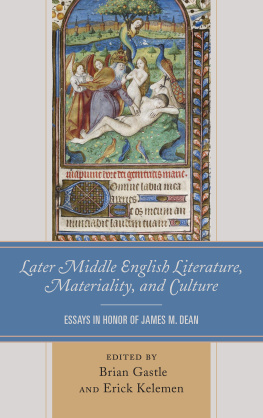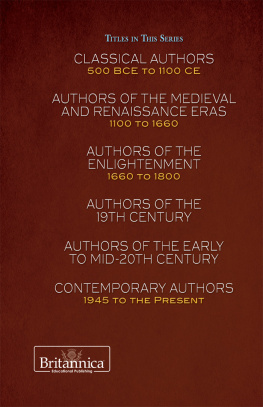First published 1999 by Ashgate Publishing
Reissued 2018 by Routledge
2 Park Square, Milton Park, Abingdon, Oxon, OX14 4RN
711 Third Avenue, New York, NY 10017, USA
Routledge is an imprint of the Taylor & Francis Group, an informa business
Copyright Gloria Allaire and the contributors, 1999
The authors have asserted their moral right under the Copyright, Designs and Patents Act, 1988, to be identified as the authors of this work.
All rights reserved. No part of this book may be reprinted or reproduced or utilised in any form or by any electronic, mechanical, or other means, now known or hereafter invented, including photocopying and recording, or in any information storage or retrieval system, without permission in writing from the publishers.
Notice:
Product or corporate names may be trademarks or registered trademarks, and are used only for identification and explanation without intent to infringe.
Publishers Note
The publisher has gone to great lengths to ensure the quality of this reprint but points out that some imperfections in the original copies may be apparent.
Disclaimer
The publisher has made every effort to trace copyright holders and welcomes correspondence from those they have been unable to contact.
A Library of Congress record exists under LC control number: 98022085
ISBN 13: 978-1-138-32712-2 (hbk)
ISBN 13: 978-0-429-44944-4 (ebk)
Gloria Allaire taught Italian at Purdue University, West Lafayette, Indiana while this book was being produced. She has published numerous articles on late medieval Italian chivalric literature, medieval manuscripts, Dante, Boccaccio and Tullia dAragona, and Andrea da Barberino and the Language of Chivalry (UP of Florida, 1997). She is currently preparing the first edition (with translation) of Il Tristano panciatichiano.
Deborah Lesko Baker is Associate Professor and Chair of French at Georgetown University, Washington, DC. She has published Narcissus and the Lover: Mythic Recovery and Reinvention in Sceves Delie (Anma Libri, 1986) and The Subject of Desire: Petrarchan Poetics and the Female Voice in Louise Labe (Purdue UP, 1996) as well as articles on Lab, Duras, DuBellay and Ronsard.
Barbara De Marco is Managing Editor for Romance Philology at the Research Center for Romance Studies, University of California, Berkeley. Her interest in hagiographie literature has led to the study of texts both medieval and modem, including a translation of Giuseppe Bonaviris Novelle saracene.
Christine Herold is Assistant Professor of English at The College of Saint Rose, Albany, NY. Her articles have appeared in English Language Notes, Translation Review and Carmina Philosophiae. Her book-length study on the intersections between Chaucer and Christian tragedy is nearing completion.
Kathleen Coyne Kelly is Associate Professor of English at Northeastern University, Boston, MA. She has published in Allegorica, Arthuriana, Assays, Parergon and Studies in Philology. She is the author of A.S. Byatt: A Study, Twayne English Author Series (G.K. Hall, 1996). With Marina Leslie, she has edited a volume of essays, Menacing Virgins: Representing Virginity in the Middle Ages and Renaissance (forthcoming from University of Delaware Press), and is currently completing a book, Hymenologies: Testing Virginity in the Middle Ages.
Lee Tobin McClain is Associate Professor of English at Seton Hill College, Greensburg, PA. She has published several articles on medieval romance, and on modem and cinematic retellings of Arthurian legends, most recently in Extrapolation and Studies in Medieval and Renaissance Teaching.
Stephen D. Powell is Assistant Professor of English at TCU, Fort Worth, Texas. He has articles published or forthcoming in Anglia, English Studies, Modern Language Review, Names: Journal of the American Name Society and Neuphilologische Mitteilungen. He is currently preparing critical editions of Roberd of Cisyle and Sir Isumbras, and a book on the texts and contexts of Middle English didactic romances.
Myriam Swennen Ruthenberg is Associate Professor of Italian and Comparative Literature at Florida Atlantic University, Boca Raton, FL. She has published articles on Boccaccio, Pasolini and Tomasi di Lampedusa. She has translated I colpi dei sensi by Erri De Luca and is currently working on an edition of essays about this new author.
MaryLynn Saul is Assistant Professor of English at Worcester State College, Worcester, MA. This year she will teach a course on Arthuriana. She has published an article on Malory in Fifteenth Century Studies. Her doctoral dissertation (Ohio State University) concerned the historical context and ideological function of Malorys Morgan le Fay.
Pauline Scott is Assistant Professor o f English at Alabama State University, Montgomery, AL. Her research interests include Ariosto, Boiardo, Woolf and Shakespeare.
This book owes its existence in part to an informal but intense discussion of modem literary and cinematic refashionings of medieval chivalric texts that took place one evening during the 1994 Modem Language Association Convention in San Diego. The interlocutors were my friends and colleagues Lori Walters, Debora Schwartz and Juliann Vitullo. Our conversation was sparked by a remarkable coincidence: in 1993 I had completed the first critical study of the Florentine chivalric author Andrea da Barberino, and in the same year a modem Italian novelization of Andreas masterpiece had appeared. Aside from suggesting a literary Zeitgeist, the simultaneous emergence of new critical and creative works about a long dead author and one of his texts demonstrated the fascination that modem readers still feel towards chivalric narratives, and opened the way to a consideration of the nature of modern retellings of their medieval and Renaissance models. This impetus indicated a new direction for my own scholarly inquiry.
As part of my subsequent investigation of the appeal that chivalric texts hold for modem readers and writers, I organized three conference sessions: Twice-Told Tales: American Literary Transformations of Chivalry held at the International Conference on Medievalism, Worcester, MA (1995); Modem Recastings of Medieval and Renaissance Chivalric Narratives held at the Modem Languages Association Convention in Chicago, IL (1995); andBeforeBeyond Il nome della rosa: Retelling the Middle Ages held at the annual conference of the American Association of Italian Studies, Chicago, IL (1998). Shorter versions of essays by Deborah Lesko Baker, Pauline Scott, Stephen Powell, Christine Herold, Barbara De Marco and myself were read in the above sessions. An early version of MaryLynn Sauls study was read at the Worcester conference in a separate session. Finally, Myriam Swennen Ruthenberg originally presented an abbreviated version of her study on Morante at the Purdue University Conference on Romance Languages, Literatures and Film in October 1997. I am grateful to the organizers of these conferences for having created appropriate fora for the presentation of our ideas and for allowing the fruits of those early efforts to be published in their present expanded and revised form.


